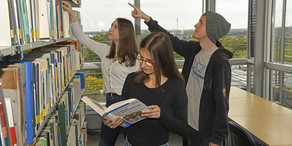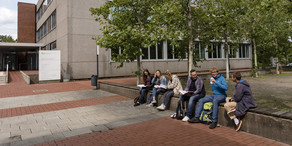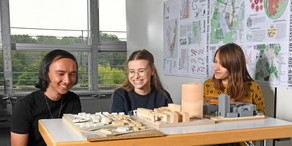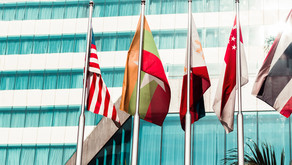SPRING Alumni Conference: Cross-Regional Dialogue 2020
- SPRING

Last 23-25 October 2020, the SPRING International Association of Development Planners (SIADP) - Chile Alumni Group held the "SPRING Cross-Regional Dialogue 2020 with the theme: Responding to the Global Pandemic towards a Sustainable and Resilient Future. The SPRING Cross-Regional Dialogue was a three-day virtual conference, which brought together practical experiences and theoretical reflections of invited speakers and SPRING Programme alumni on planning policies, guidelines and practices related to the global COVID-19 pandemic response. Its main objective was to have a deeper understanding of how these practices contribute to emerging transformative planning approaches and resilient regional spatial development.
Last 23-25 October 2020, the SPRING International Association of Development Planners (SIADP) - Chile Alumni Group held the "SPRING Cross-Regional Dialogue 2020 with the theme: Responding to the Global Pandemic towards a Sustainable and Resilient Future. The SPRING Cross-Regional Dialogue was a three-day virtual conference, which brought together practical experiences and theoretical reflections of invited speakers and SPRING Programme alumni on planning policies, guidelines and practices related to the global COVID-19 pandemic response. Its main objective was to have a deeper understanding of how these practices contribute to emerging transformative planning approaches and resilient regional spatial development.
The SIADP is an association of former students of the SPRING Programme, whose members are coming from countries in Asia, Africa, Latin America and Europe. In July 2019, the SIADP - Chile Alumni Group held its first Winter School with a theme: Evolving Dynamics and Linkages to support the achievement of 2030 Agenda on Sustainable Development Goals 11 and 13(Sustainable Cities and Communities and Climate Action). Some of the concluded activities were the multi-stakeholder round table discussions, interaction with the local community, and proposal recommendations on how to manage their community wetland park.
This year the conference was originally planned to take place in the Philippines. However, due to the COVID-19 pandemic it was rethought as a dialogue about the challenges that different countries are currently facing. Focusing on planning sectors that are most affected by the pandemic, while incorporating the achievement of the sustainable development goals 1 - Zero Hunger, 2 - No poverty, 3 - Good Health and Well-being, 4 - Quality education and 11 - Sustainable Cities and Communities. With this, the main objective of the conference was to have a deeper understanding of how these practices contribute to emerging transformative planning approaches and resilient regional spatial development.
Opening remarks were given by Mehmooda Maqsood, a SPRING Programme alumna from TU Dortmund and Universidad Austral de Chile (UACh), as well as Dr. Carmelita Liwag of the University of the Philippines School of Urban and Regional Planning (UP SURP) and Dr. Cesar Guala Catalán, Vice-Dean of the Faculty of Economic Sciences and Administration (FACEA), UACh, Valdivia.
During the Opening Session on 23rd October, a panel discussed the recovery and future of markets, public space and informal economy as well as the design protocols to govern safe cities and communities. The first day session was moderated by Moritz Kasper, a consultant and PhD candidate from the Technical University of Dortmund. Speakers of the Day 01 sessions were Dr. Jennifer Lenhart, Global Lead WWF Cities, Dr. Antonio Zumelzu of the Department of Architecture and the Arts and Dr. Felix Fuders of FACEA, both department members of UACh, Valdivia. Prior to the formal introduction of this session, a special tribute through a message of good memories, reminiscent photos and wonderful stories was given to Dr. Teodor Kausel Kroll, former director of SPRING Programme in Universidad Austral de Chile as he peacefully departed two days prior to the start of the conference.
The Second Day Sessions of the virtual conference held four dialogue and workshop sessions. The first one focused on food security strategies: systems, distribution and network management for future pandemics -urban agriculture. TU Dortmund and UP SURP - SPRING Programme alumna and the current Antipolo City Planning and Development Coordinator Rowena T. Zapanta presented her first-hand experience as a frontliner and how Antipolo city adapted innovation and out-of-the-box solutions to aid in the current COVID-19 pandemic. The session was moderated by TU Dortmund and UACh - SPRING Programme alumnus and current College Secretary of University of Santo Tomas College of Architecture Vinson P. Serrano.
Another workshop session addressed the circular economy as a way to combat poverty and focusing on SDG 2 - No Poverty, with speaker Frans Beckers, the co-founder of Cimar y Cofa in the Netherlands; and with moderator Maija Kale,the advisor of digitization and sustainability in the Office of the Nordic Council of Ministers in Latvia,. The third workshop was held by Prof. Emeritus Dr. Einhard Schmidt-Kallert, former director of the International Spatial Planning Center of the TU Dortmund University, and was moderated by Dr. Genet Alem, from the Faculty of International Planning Studies of TU Dortmund University, also a SPRING Alumni. The session focused on hybrid sectors focusing on Germany's COVID-19 response with the focus on SDG 3 - Good Health and Well-being.
The last block was oriented to discuss the future of education and the planning of digital innovation in the provision of services focused on SDG 4 - Quality Education. Dr. Daniel Vicente Lühr Sierra, an academic from the Institute of Electricity and Electronics of Universidad Austral de Chile, delivered a presentation, moderated by Leo Mutisya, the manager of Stakeholder engagement and Professional Ethics in the Kenya Media Council.
Finally, the Closing Session on October 25 was dedicated to resilience and inclusion in spatial development planning in context of the pandemic, moderated by Dr. Himanshu Shekhar, an academic in the University of United Nations and a TU Dortmund - UACh SPRING Programme Alumnus. The speakers were Julio Estrada, a consultant in urban and regional planning and management member of the National Planning Secretariat of Guatemala and a TU Dortmund and Ardhi University - Dar es Salaam SPRING Programme alumnus; Dr. Clifford Amoako, the Coordinator of Kwameh Nkrumah University of Science and Technology, Planning Department of Graduate Planning Programs, Kumasi, Ghana; and Bonnie Andrew Mendoza, procurement research consultant at the Asian Development Bank headquarters in Metro Manila, Philippines, and a TU Dortmund - UACh SPRING Programme Alumnus. The session was closed by Marygrace Balinos, TU Dortmund and UACh - SPRING Programme alumna and co-convener of the SPRING Cross-Regional Dialogue 2020.
A total of 230 participants from 28 countries around the world attended the online conference. With the generous support of Alumniportal Deutschland, the online conference was done via Zoom and live streamed via Alumniportal Deutschland YouTube channel.
To further the contributions of this conference towards the achievement of sustainable and resilient development, the Unitas Publication of the University of Santo Tomas, the official publication partner of the cross-regional dialogue will be compiling scientific publications as a form of recommendation for policymakers, development planners and academics. A special issue in November 2021 will be published in the academic journal of University of Santo Tomas in Manila, Philippines.
The SIADP is composed of SPRING Programme alumni, is an association of development planners whose focus is to discuss timely and relevant spatial planning matters, with the aim to recommend practical solutions in a particular context, mostly but not always for developing economic regions. Its aim is also to keep former students united from many different contexts of the world, bringing an array of experiences to the future of spatial planning.
Contributions from Mehmooda Maqsood, Vinson Serrano, Marygrace Balinos and Augustine Yaw Asuah.












